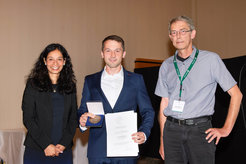Felix Glang receives Otto Hahn Medal
Award honors contributions to innovative methods in magnetic resonance imaging
- Novel methods for enhanced brain imaging enable better images in less time.
- Flexible MRI components can be targeted at specific regions, improving image quality.
- Accelerated metabolic imaging shows promise for tumor diagnostics.

Felix Glang, of the Max Planck Institute for Biological Cybernetics in Tübingen, has been awarded the Otto Hahn Medal in recognition of his achievements in developing new magnetic resonance imaging (MRI) methods. Glang's methods enable clearer and faster brain scans.
During an MRI scan, specific atomic nuclei – primarily the protons of hydrogen found in water – are excited by electromagnetic pulses. Specialized coils then detect the signals emitted as these nuclei and re-emit electromagnetic energy. Glang investigated new types of receiver coils with electronically adjustable orientations. “These flexible coils are like shining a flashlight into specific areas of the brain,” he explains. “This enables us to pinpoint the source of the signal more accurately, which improves the image quality.”
Glang also worked on a special MRI technique in which hydrogen nuclei are indirectly excited by other molecules, much like playing a billiard ball over the rails. This method is particularly suitable for visualizing certain metabolic processes and the pH value of solutions, and therefore has great potential for tumor diagnosis. With the help of machine learning, Glang managed to omit certain steps in the excitation of the nuclei and thereby speed up the process significantly. This reduces cost, lessens patient discomfort and reduces imaging errors caused by patient movement.
The “magic triangle” of MRI research
Shorter measurement time, higher resolution and reduced image noise are three central objectives of MRI research, often referred to as the “magic triangle” of magnetic resonance imaging. While progress in one area usually comes at the expense of the other two, Glang achieved improvements in all three simultaneously through the above-described work and others. “We have shifted the magic triangle as a whole slightly further into the positive range,” says Glang.
To achieve this, considerable technical and scientific hurdles had to be overcome. “I am impressed by Felix Glang's creativity and perseverance,” said Klaus Scheffler, head of the MRI center at the MPI, who supervised his doctoral work jointly with Moritz Zaiss of the University Clinics Erlangen. “His contributions showcase a strong synergy of hardware, acquisition methods and advanced data processing.”
Since 1978, the Otto Hahn Medal of the Max Planck Society is annually awarded to young researchers for outstanding scientific achievements, mostly in connection with their doctorate. It is endowed with 7,500 euros of prize money.
